MNG10723 Hospitality History and Culture Report: Home Concept Analysis
VerifiedAdded on 2023/06/04
|12
|3222
|238
Report
AI Summary
This report explores the application of the 'home' concept within the hospitality industry, focusing on how hotels create a sense of belonging and comfort for their guests. The report begins by defining the concept of 'home' and its importance in the context of tourism and accommodation. It then introduces the Imperial Palace, a hotel company, as a case study, examining its strategies for creating a home-like experience for guests and employees. The report delves into the significance of service quality, customer satisfaction, and the overall guest experience, highlighting elements such as ambiance, food quality, and staff interaction. It also discusses the role of amenities, design, and community engagement in fostering a sense of familiarity and belonging. The report concludes with recommendations for how the Imperial Palace can further enhance its home-like environment and improve customer loyalty. The report also covers the historical background of the business and the factors that are required to create a home experience for the tourist so that the person has a sense of belonging, as this is the most important element that the clients look for other than the hospitality, the food, the ambience and others.
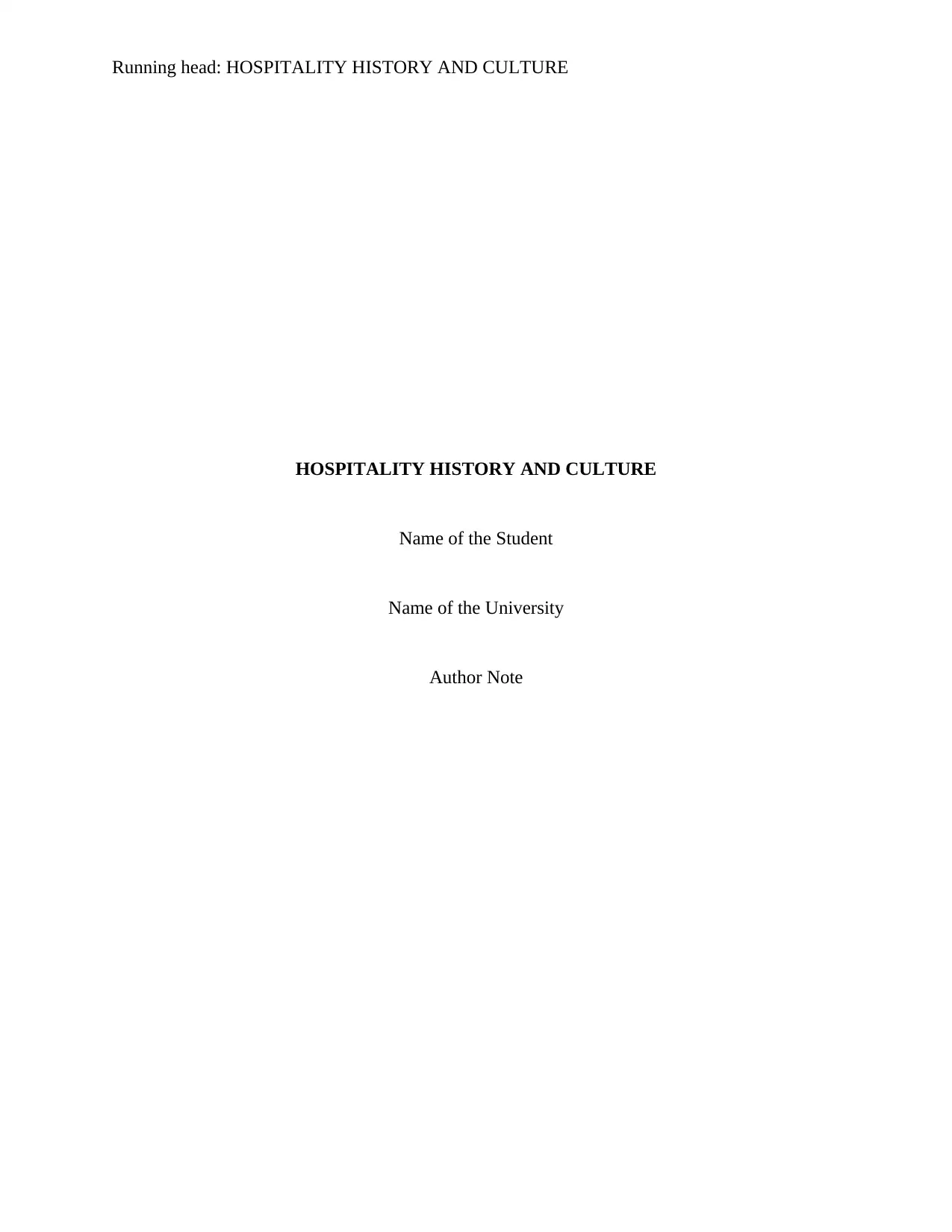
Running head: HOSPITALITY HISTORY AND CULTURE
HOSPITALITY HISTORY AND CULTURE
Name of the Student
Name of the University
Author Note
HOSPITALITY HISTORY AND CULTURE
Name of the Student
Name of the University
Author Note
Paraphrase This Document
Need a fresh take? Get an instant paraphrase of this document with our AI Paraphraser
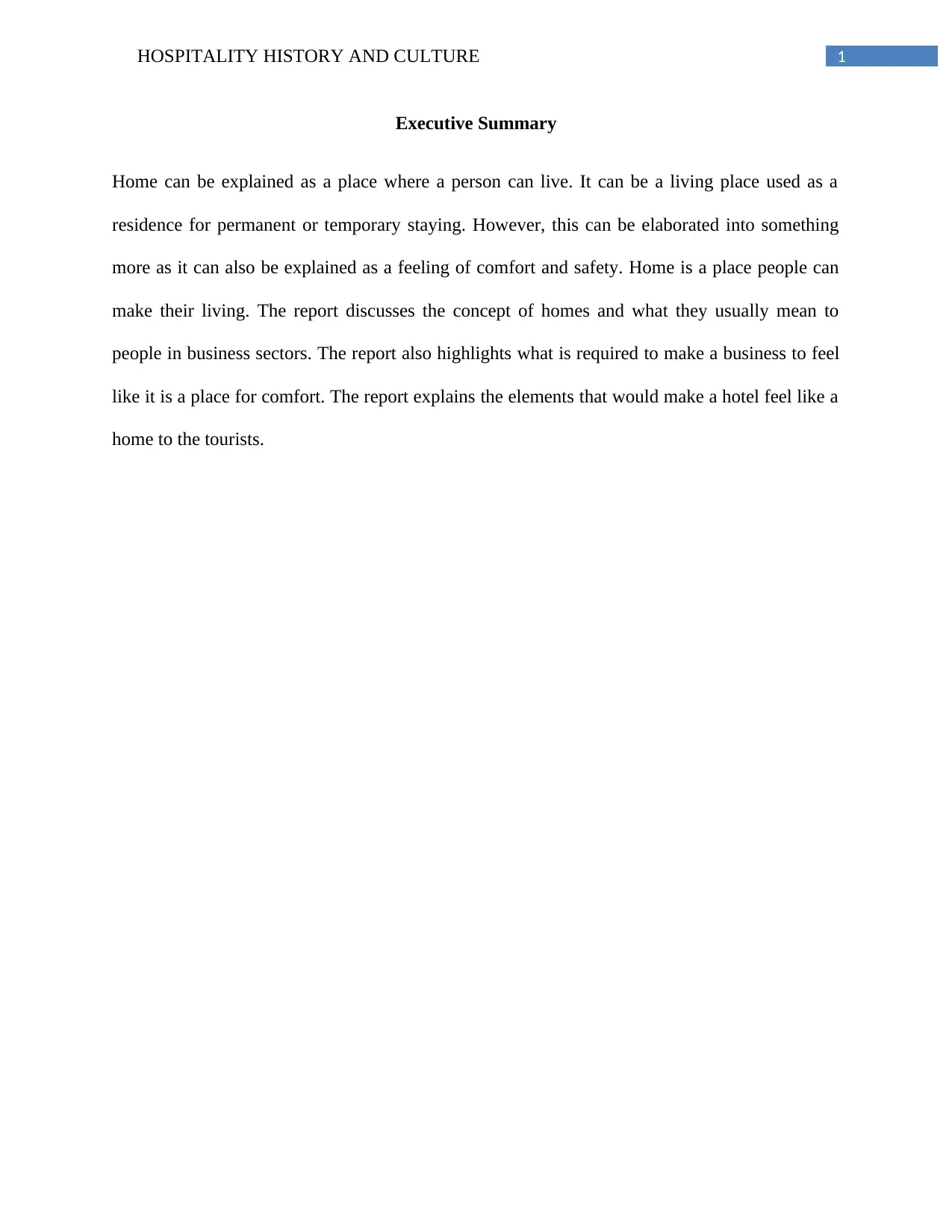
1HOSPITALITY HISTORY AND CULTURE
Executive Summary
Home can be explained as a place where a person can live. It can be a living place used as a
residence for permanent or temporary staying. However, this can be elaborated into something
more as it can also be explained as a feeling of comfort and safety. Home is a place people can
make their living. The report discusses the concept of homes and what they usually mean to
people in business sectors. The report also highlights what is required to make a business to feel
like it is a place for comfort. The report explains the elements that would make a hotel feel like a
home to the tourists.
Executive Summary
Home can be explained as a place where a person can live. It can be a living place used as a
residence for permanent or temporary staying. However, this can be elaborated into something
more as it can also be explained as a feeling of comfort and safety. Home is a place people can
make their living. The report discusses the concept of homes and what they usually mean to
people in business sectors. The report also highlights what is required to make a business to feel
like it is a place for comfort. The report explains the elements that would make a hotel feel like a
home to the tourists.
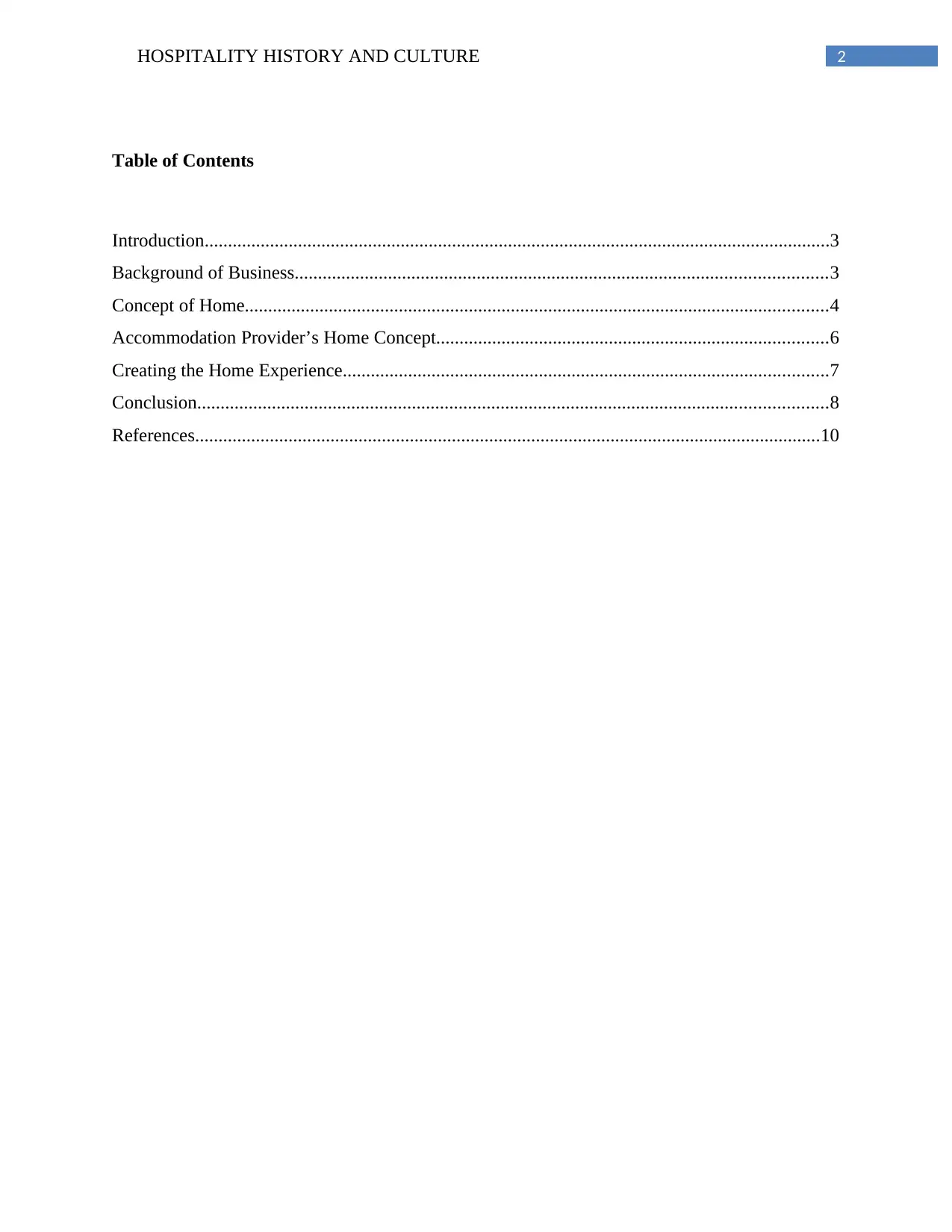
2HOSPITALITY HISTORY AND CULTURE
Table of Contents
Introduction......................................................................................................................................3
Background of Business..................................................................................................................3
Concept of Home.............................................................................................................................4
Accommodation Provider’s Home Concept....................................................................................6
Creating the Home Experience........................................................................................................7
Conclusion.......................................................................................................................................8
References......................................................................................................................................10
Table of Contents
Introduction......................................................................................................................................3
Background of Business..................................................................................................................3
Concept of Home.............................................................................................................................4
Accommodation Provider’s Home Concept....................................................................................6
Creating the Home Experience........................................................................................................7
Conclusion.......................................................................................................................................8
References......................................................................................................................................10
⊘ This is a preview!⊘
Do you want full access?
Subscribe today to unlock all pages.

Trusted by 1+ million students worldwide
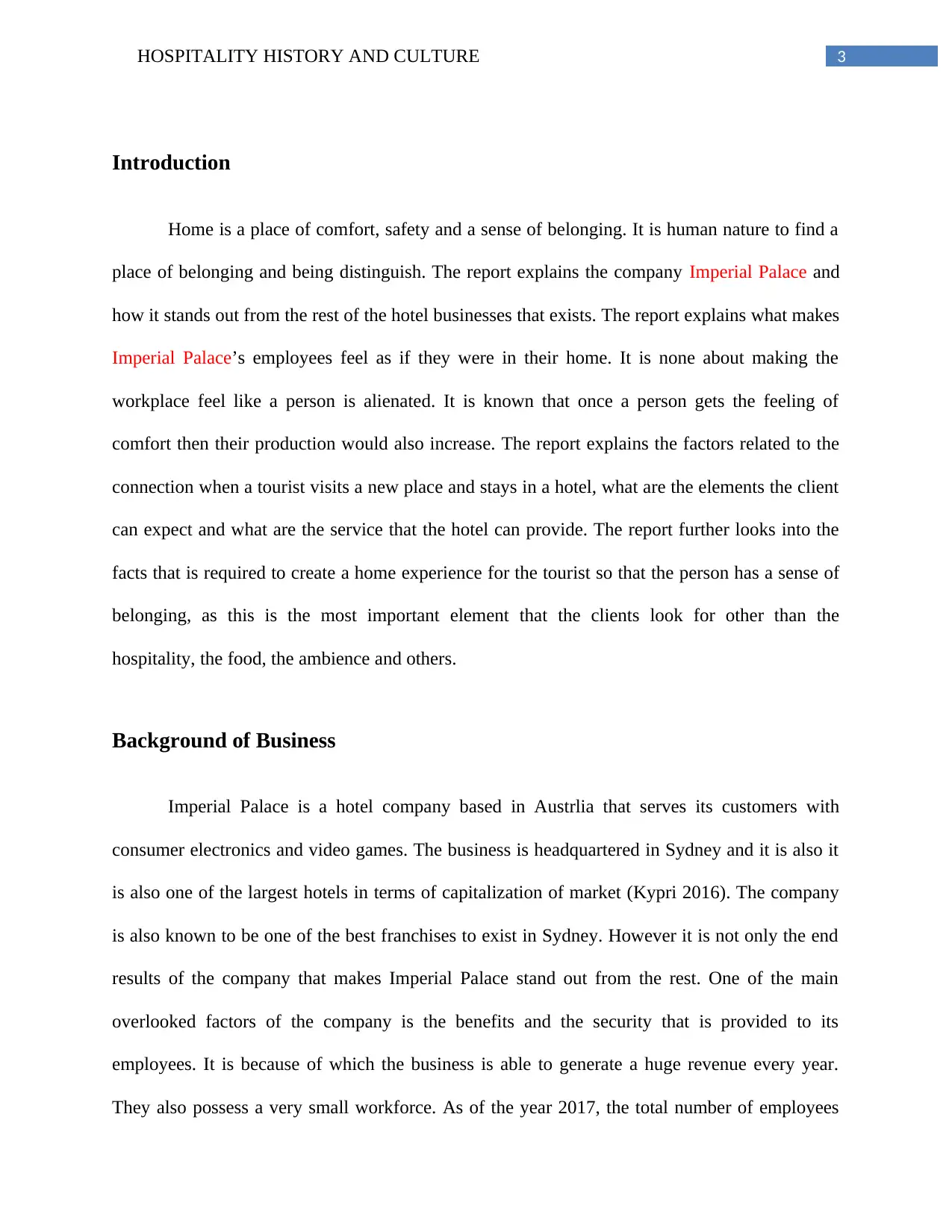
3HOSPITALITY HISTORY AND CULTURE
Introduction
Home is a place of comfort, safety and a sense of belonging. It is human nature to find a
place of belonging and being distinguish. The report explains the company Imperial Palace and
how it stands out from the rest of the hotel businesses that exists. The report explains what makes
Imperial Palace’s employees feel as if they were in their home. It is none about making the
workplace feel like a person is alienated. It is known that once a person gets the feeling of
comfort then their production would also increase. The report explains the factors related to the
connection when a tourist visits a new place and stays in a hotel, what are the elements the client
can expect and what are the service that the hotel can provide. The report further looks into the
facts that is required to create a home experience for the tourist so that the person has a sense of
belonging, as this is the most important element that the clients look for other than the
hospitality, the food, the ambience and others.
Background of Business
Imperial Palace is a hotel company based in Austrlia that serves its customers with
consumer electronics and video games. The business is headquartered in Sydney and it is also it
is also one of the largest hotels in terms of capitalization of market (Kypri 2016). The company
is also known to be one of the best franchises to exist in Sydney. However it is not only the end
results of the company that makes Imperial Palace stand out from the rest. One of the main
overlooked factors of the company is the benefits and the security that is provided to its
employees. It is because of which the business is able to generate a huge revenue every year.
They also possess a very small workforce. As of the year 2017, the total number of employees
Introduction
Home is a place of comfort, safety and a sense of belonging. It is human nature to find a
place of belonging and being distinguish. The report explains the company Imperial Palace and
how it stands out from the rest of the hotel businesses that exists. The report explains what makes
Imperial Palace’s employees feel as if they were in their home. It is none about making the
workplace feel like a person is alienated. It is known that once a person gets the feeling of
comfort then their production would also increase. The report explains the factors related to the
connection when a tourist visits a new place and stays in a hotel, what are the elements the client
can expect and what are the service that the hotel can provide. The report further looks into the
facts that is required to create a home experience for the tourist so that the person has a sense of
belonging, as this is the most important element that the clients look for other than the
hospitality, the food, the ambience and others.
Background of Business
Imperial Palace is a hotel company based in Austrlia that serves its customers with
consumer electronics and video games. The business is headquartered in Sydney and it is also it
is also one of the largest hotels in terms of capitalization of market (Kypri 2016). The company
is also known to be one of the best franchises to exist in Sydney. However it is not only the end
results of the company that makes Imperial Palace stand out from the rest. One of the main
overlooked factors of the company is the benefits and the security that is provided to its
employees. It is because of which the business is able to generate a huge revenue every year.
They also possess a very small workforce. As of the year 2017, the total number of employees
Paraphrase This Document
Need a fresh take? Get an instant paraphrase of this document with our AI Paraphraser
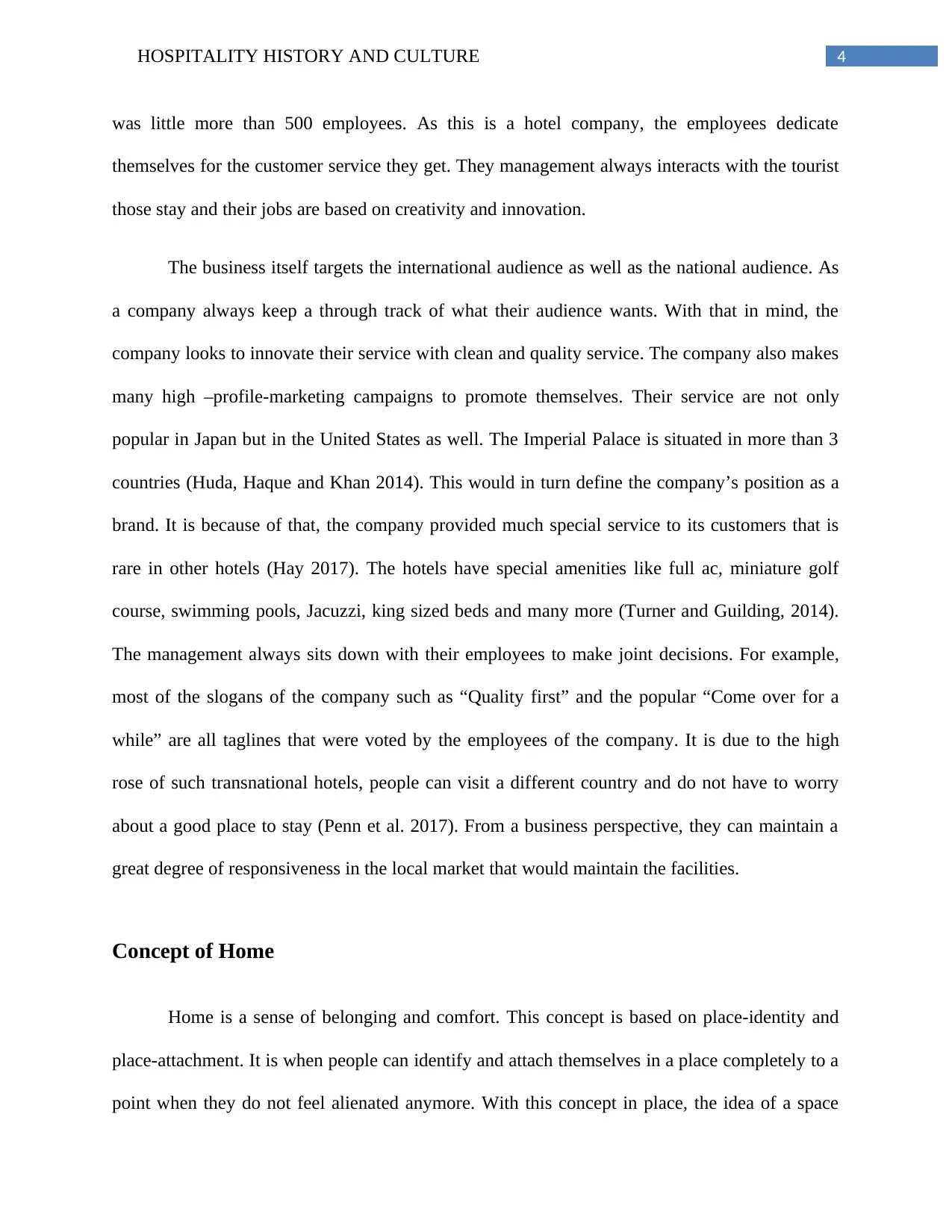
4HOSPITALITY HISTORY AND CULTURE
was little more than 500 employees. As this is a hotel company, the employees dedicate
themselves for the customer service they get. They management always interacts with the tourist
those stay and their jobs are based on creativity and innovation.
The business itself targets the international audience as well as the national audience. As
a company always keep a through track of what their audience wants. With that in mind, the
company looks to innovate their service with clean and quality service. The company also makes
many high –profile-marketing campaigns to promote themselves. Their service are not only
popular in Japan but in the United States as well. The Imperial Palace is situated in more than 3
countries (Huda, Haque and Khan 2014). This would in turn define the company’s position as a
brand. It is because of that, the company provided much special service to its customers that is
rare in other hotels (Hay 2017). The hotels have special amenities like full ac, miniature golf
course, swimming pools, Jacuzzi, king sized beds and many more (Turner and Guilding, 2014).
The management always sits down with their employees to make joint decisions. For example,
most of the slogans of the company such as “Quality first” and the popular “Come over for a
while” are all taglines that were voted by the employees of the company. It is due to the high
rose of such transnational hotels, people can visit a different country and do not have to worry
about a good place to stay (Penn et al. 2017). From a business perspective, they can maintain a
great degree of responsiveness in the local market that would maintain the facilities.
Concept of Home
Home is a sense of belonging and comfort. This concept is based on place-identity and
place-attachment. It is when people can identify and attach themselves in a place completely to a
point when they do not feel alienated anymore. With this concept in place, the idea of a space
was little more than 500 employees. As this is a hotel company, the employees dedicate
themselves for the customer service they get. They management always interacts with the tourist
those stay and their jobs are based on creativity and innovation.
The business itself targets the international audience as well as the national audience. As
a company always keep a through track of what their audience wants. With that in mind, the
company looks to innovate their service with clean and quality service. The company also makes
many high –profile-marketing campaigns to promote themselves. Their service are not only
popular in Japan but in the United States as well. The Imperial Palace is situated in more than 3
countries (Huda, Haque and Khan 2014). This would in turn define the company’s position as a
brand. It is because of that, the company provided much special service to its customers that is
rare in other hotels (Hay 2017). The hotels have special amenities like full ac, miniature golf
course, swimming pools, Jacuzzi, king sized beds and many more (Turner and Guilding, 2014).
The management always sits down with their employees to make joint decisions. For example,
most of the slogans of the company such as “Quality first” and the popular “Come over for a
while” are all taglines that were voted by the employees of the company. It is due to the high
rose of such transnational hotels, people can visit a different country and do not have to worry
about a good place to stay (Penn et al. 2017). From a business perspective, they can maintain a
great degree of responsiveness in the local market that would maintain the facilities.
Concept of Home
Home is a sense of belonging and comfort. This concept is based on place-identity and
place-attachment. It is when people can identify and attach themselves in a place completely to a
point when they do not feel alienated anymore. With this concept in place, the idea of a space
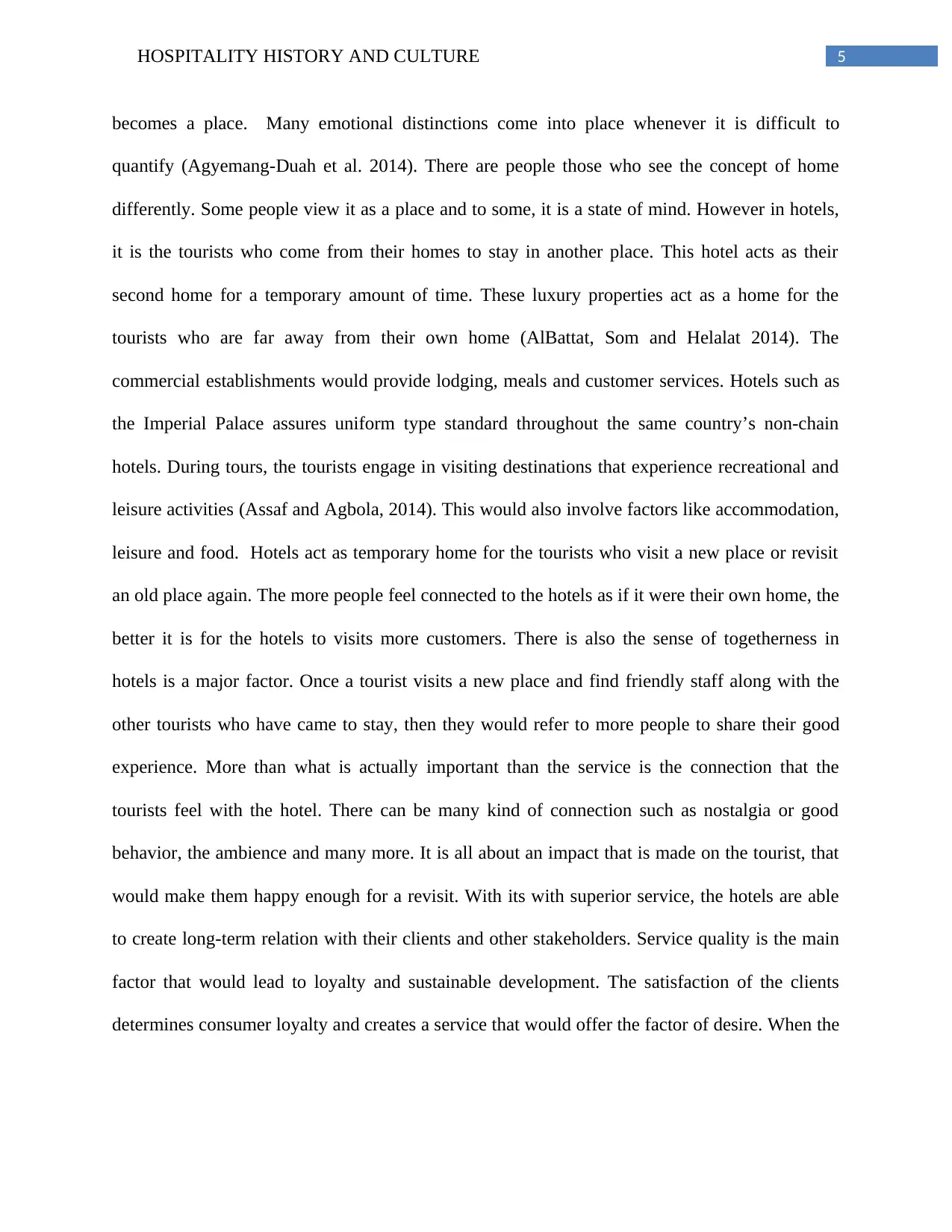
5HOSPITALITY HISTORY AND CULTURE
becomes a place. Many emotional distinctions come into place whenever it is difficult to
quantify (Agyemang-Duah et al. 2014). There are people those who see the concept of home
differently. Some people view it as a place and to some, it is a state of mind. However in hotels,
it is the tourists who come from their homes to stay in another place. This hotel acts as their
second home for a temporary amount of time. These luxury properties act as a home for the
tourists who are far away from their own home (AlBattat, Som and Helalat 2014). The
commercial establishments would provide lodging, meals and customer services. Hotels such as
the Imperial Palace assures uniform type standard throughout the same country’s non-chain
hotels. During tours, the tourists engage in visiting destinations that experience recreational and
leisure activities (Assaf and Agbola, 2014). This would also involve factors like accommodation,
leisure and food. Hotels act as temporary home for the tourists who visit a new place or revisit
an old place again. The more people feel connected to the hotels as if it were their own home, the
better it is for the hotels to visits more customers. There is also the sense of togetherness in
hotels is a major factor. Once a tourist visits a new place and find friendly staff along with the
other tourists who have came to stay, then they would refer to more people to share their good
experience. More than what is actually important than the service is the connection that the
tourists feel with the hotel. There can be many kind of connection such as nostalgia or good
behavior, the ambience and many more. It is all about an impact that is made on the tourist, that
would make them happy enough for a revisit. With its with superior service, the hotels are able
to create long-term relation with their clients and other stakeholders. Service quality is the main
factor that would lead to loyalty and sustainable development. The satisfaction of the clients
determines consumer loyalty and creates a service that would offer the factor of desire. When the
becomes a place. Many emotional distinctions come into place whenever it is difficult to
quantify (Agyemang-Duah et al. 2014). There are people those who see the concept of home
differently. Some people view it as a place and to some, it is a state of mind. However in hotels,
it is the tourists who come from their homes to stay in another place. This hotel acts as their
second home for a temporary amount of time. These luxury properties act as a home for the
tourists who are far away from their own home (AlBattat, Som and Helalat 2014). The
commercial establishments would provide lodging, meals and customer services. Hotels such as
the Imperial Palace assures uniform type standard throughout the same country’s non-chain
hotels. During tours, the tourists engage in visiting destinations that experience recreational and
leisure activities (Assaf and Agbola, 2014). This would also involve factors like accommodation,
leisure and food. Hotels act as temporary home for the tourists who visit a new place or revisit
an old place again. The more people feel connected to the hotels as if it were their own home, the
better it is for the hotels to visits more customers. There is also the sense of togetherness in
hotels is a major factor. Once a tourist visits a new place and find friendly staff along with the
other tourists who have came to stay, then they would refer to more people to share their good
experience. More than what is actually important than the service is the connection that the
tourists feel with the hotel. There can be many kind of connection such as nostalgia or good
behavior, the ambience and many more. It is all about an impact that is made on the tourist, that
would make them happy enough for a revisit. With its with superior service, the hotels are able
to create long-term relation with their clients and other stakeholders. Service quality is the main
factor that would lead to loyalty and sustainable development. The satisfaction of the clients
determines consumer loyalty and creates a service that would offer the factor of desire. When the
⊘ This is a preview!⊘
Do you want full access?
Subscribe today to unlock all pages.

Trusted by 1+ million students worldwide
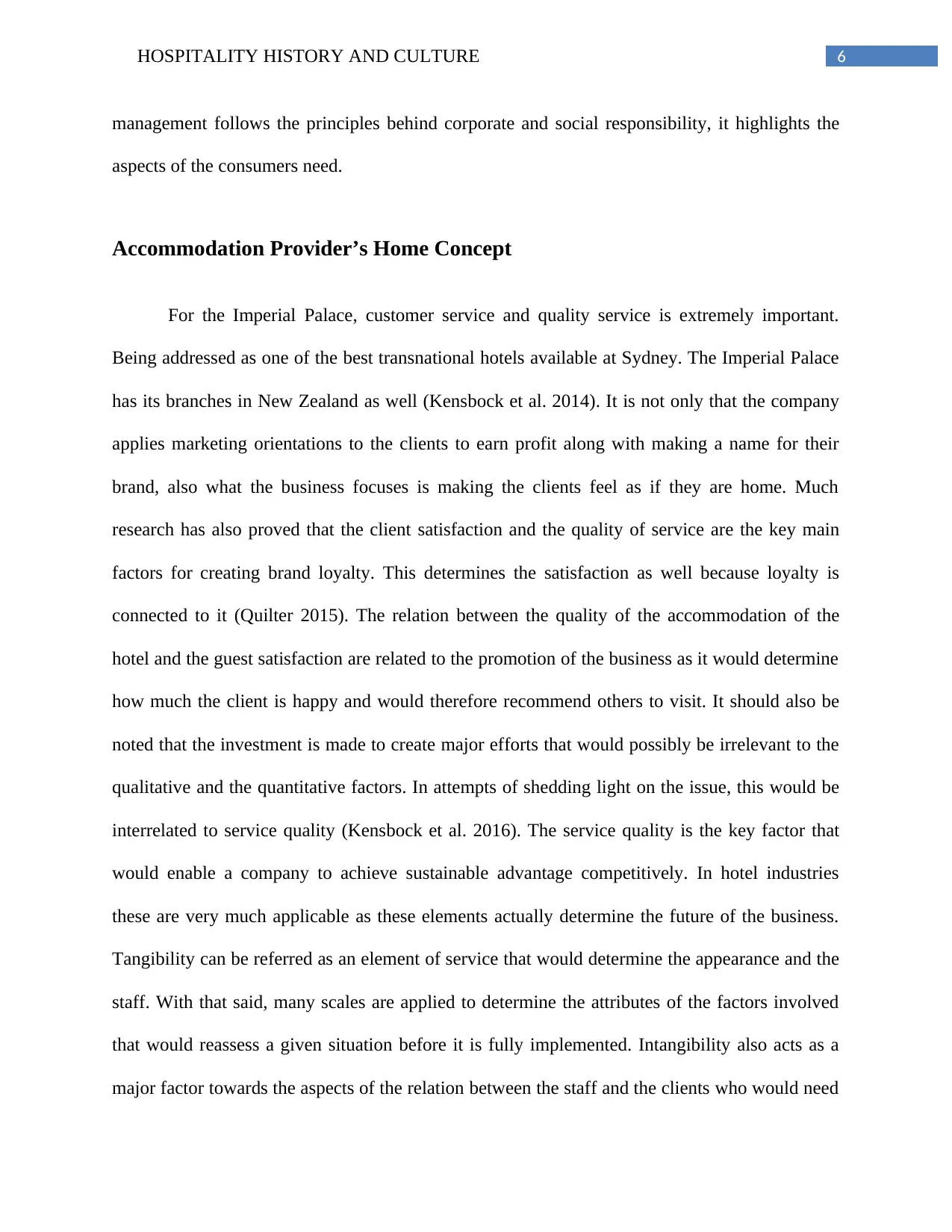
6HOSPITALITY HISTORY AND CULTURE
management follows the principles behind corporate and social responsibility, it highlights the
aspects of the consumers need.
Accommodation Provider’s Home Concept
For the Imperial Palace, customer service and quality service is extremely important.
Being addressed as one of the best transnational hotels available at Sydney. The Imperial Palace
has its branches in New Zealand as well (Kensbock et al. 2014). It is not only that the company
applies marketing orientations to the clients to earn profit along with making a name for their
brand, also what the business focuses is making the clients feel as if they are home. Much
research has also proved that the client satisfaction and the quality of service are the key main
factors for creating brand loyalty. This determines the satisfaction as well because loyalty is
connected to it (Quilter 2015). The relation between the quality of the accommodation of the
hotel and the guest satisfaction are related to the promotion of the business as it would determine
how much the client is happy and would therefore recommend others to visit. It should also be
noted that the investment is made to create major efforts that would possibly be irrelevant to the
qualitative and the quantitative factors. In attempts of shedding light on the issue, this would be
interrelated to service quality (Kensbock et al. 2016). The service quality is the key factor that
would enable a company to achieve sustainable advantage competitively. In hotel industries
these are very much applicable as these elements actually determine the future of the business.
Tangibility can be referred as an element of service that would determine the appearance and the
staff. With that said, many scales are applied to determine the attributes of the factors involved
that would reassess a given situation before it is fully implemented. Intangibility also acts as a
major factor towards the aspects of the relation between the staff and the clients who would need
management follows the principles behind corporate and social responsibility, it highlights the
aspects of the consumers need.
Accommodation Provider’s Home Concept
For the Imperial Palace, customer service and quality service is extremely important.
Being addressed as one of the best transnational hotels available at Sydney. The Imperial Palace
has its branches in New Zealand as well (Kensbock et al. 2014). It is not only that the company
applies marketing orientations to the clients to earn profit along with making a name for their
brand, also what the business focuses is making the clients feel as if they are home. Much
research has also proved that the client satisfaction and the quality of service are the key main
factors for creating brand loyalty. This determines the satisfaction as well because loyalty is
connected to it (Quilter 2015). The relation between the quality of the accommodation of the
hotel and the guest satisfaction are related to the promotion of the business as it would determine
how much the client is happy and would therefore recommend others to visit. It should also be
noted that the investment is made to create major efforts that would possibly be irrelevant to the
qualitative and the quantitative factors. In attempts of shedding light on the issue, this would be
interrelated to service quality (Kensbock et al. 2016). The service quality is the key factor that
would enable a company to achieve sustainable advantage competitively. In hotel industries
these are very much applicable as these elements actually determine the future of the business.
Tangibility can be referred as an element of service that would determine the appearance and the
staff. With that said, many scales are applied to determine the attributes of the factors involved
that would reassess a given situation before it is fully implemented. Intangibility also acts as a
major factor towards the aspects of the relation between the staff and the clients who would need
Paraphrase This Document
Need a fresh take? Get an instant paraphrase of this document with our AI Paraphraser
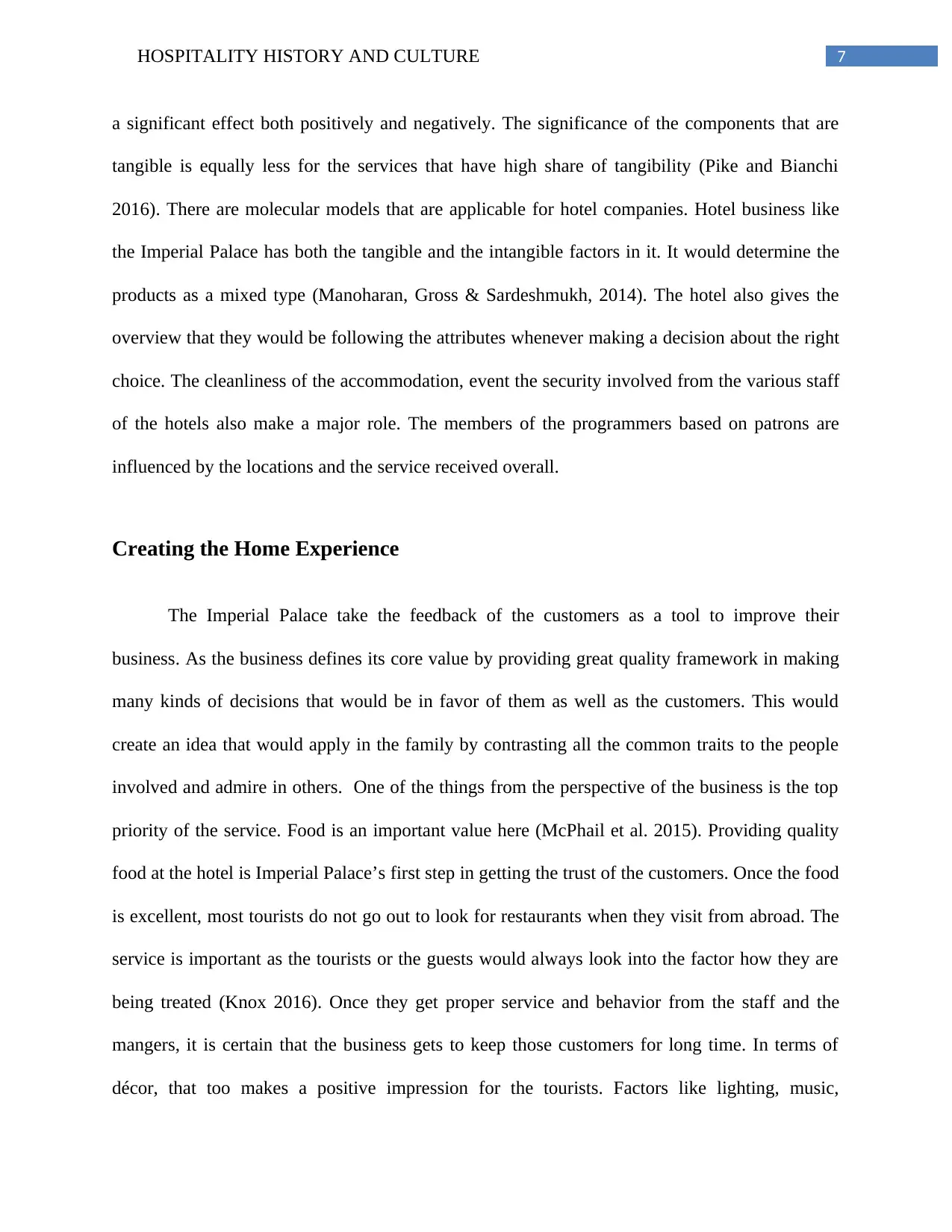
7HOSPITALITY HISTORY AND CULTURE
a significant effect both positively and negatively. The significance of the components that are
tangible is equally less for the services that have high share of tangibility (Pike and Bianchi
2016). There are molecular models that are applicable for hotel companies. Hotel business like
the Imperial Palace has both the tangible and the intangible factors in it. It would determine the
products as a mixed type (Manoharan, Gross & Sardeshmukh, 2014). The hotel also gives the
overview that they would be following the attributes whenever making a decision about the right
choice. The cleanliness of the accommodation, event the security involved from the various staff
of the hotels also make a major role. The members of the programmers based on patrons are
influenced by the locations and the service received overall.
Creating the Home Experience
The Imperial Palace take the feedback of the customers as a tool to improve their
business. As the business defines its core value by providing great quality framework in making
many kinds of decisions that would be in favor of them as well as the customers. This would
create an idea that would apply in the family by contrasting all the common traits to the people
involved and admire in others. One of the things from the perspective of the business is the top
priority of the service. Food is an important value here (McPhail et al. 2015). Providing quality
food at the hotel is Imperial Palace’s first step in getting the trust of the customers. Once the food
is excellent, most tourists do not go out to look for restaurants when they visit from abroad. The
service is important as the tourists or the guests would always look into the factor how they are
being treated (Knox 2016). Once they get proper service and behavior from the staff and the
mangers, it is certain that the business gets to keep those customers for long time. In terms of
décor, that too makes a positive impression for the tourists. Factors like lighting, music,
a significant effect both positively and negatively. The significance of the components that are
tangible is equally less for the services that have high share of tangibility (Pike and Bianchi
2016). There are molecular models that are applicable for hotel companies. Hotel business like
the Imperial Palace has both the tangible and the intangible factors in it. It would determine the
products as a mixed type (Manoharan, Gross & Sardeshmukh, 2014). The hotel also gives the
overview that they would be following the attributes whenever making a decision about the right
choice. The cleanliness of the accommodation, event the security involved from the various staff
of the hotels also make a major role. The members of the programmers based on patrons are
influenced by the locations and the service received overall.
Creating the Home Experience
The Imperial Palace take the feedback of the customers as a tool to improve their
business. As the business defines its core value by providing great quality framework in making
many kinds of decisions that would be in favor of them as well as the customers. This would
create an idea that would apply in the family by contrasting all the common traits to the people
involved and admire in others. One of the things from the perspective of the business is the top
priority of the service. Food is an important value here (McPhail et al. 2015). Providing quality
food at the hotel is Imperial Palace’s first step in getting the trust of the customers. Once the food
is excellent, most tourists do not go out to look for restaurants when they visit from abroad. The
service is important as the tourists or the guests would always look into the factor how they are
being treated (Knox 2016). Once they get proper service and behavior from the staff and the
mangers, it is certain that the business gets to keep those customers for long time. In terms of
décor, that too makes a positive impression for the tourists. Factors like lighting, music,
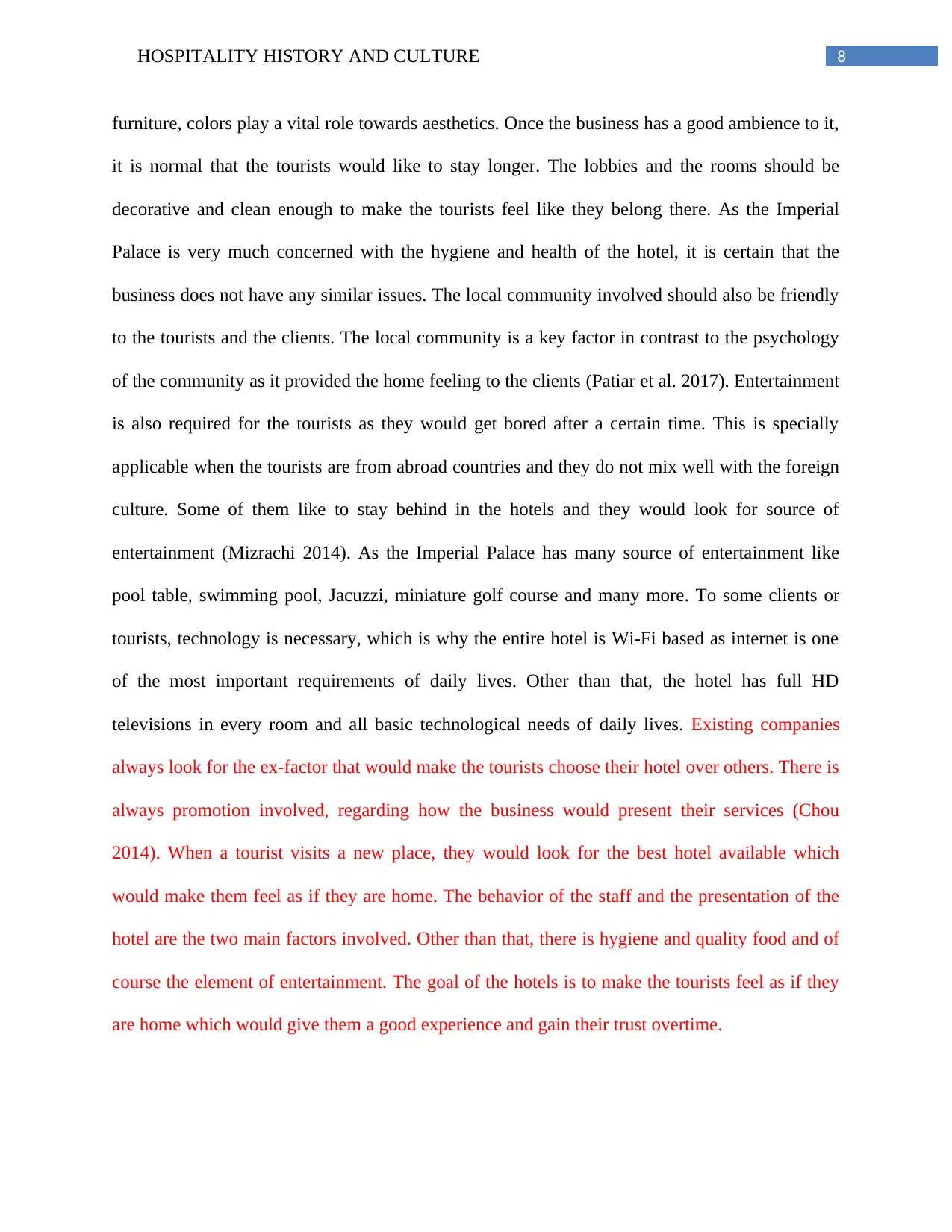
8HOSPITALITY HISTORY AND CULTURE
furniture, colors play a vital role towards aesthetics. Once the business has a good ambience to it,
it is normal that the tourists would like to stay longer. The lobbies and the rooms should be
decorative and clean enough to make the tourists feel like they belong there. As the Imperial
Palace is very much concerned with the hygiene and health of the hotel, it is certain that the
business does not have any similar issues. The local community involved should also be friendly
to the tourists and the clients. The local community is a key factor in contrast to the psychology
of the community as it provided the home feeling to the clients (Patiar et al. 2017). Entertainment
is also required for the tourists as they would get bored after a certain time. This is specially
applicable when the tourists are from abroad countries and they do not mix well with the foreign
culture. Some of them like to stay behind in the hotels and they would look for source of
entertainment (Mizrachi 2014). As the Imperial Palace has many source of entertainment like
pool table, swimming pool, Jacuzzi, miniature golf course and many more. To some clients or
tourists, technology is necessary, which is why the entire hotel is Wi-Fi based as internet is one
of the most important requirements of daily lives. Other than that, the hotel has full HD
televisions in every room and all basic technological needs of daily lives. Existing companies
always look for the ex-factor that would make the tourists choose their hotel over others. There is
always promotion involved, regarding how the business would present their services (Chou
2014). When a tourist visits a new place, they would look for the best hotel available which
would make them feel as if they are home. The behavior of the staff and the presentation of the
hotel are the two main factors involved. Other than that, there is hygiene and quality food and of
course the element of entertainment. The goal of the hotels is to make the tourists feel as if they
are home which would give them a good experience and gain their trust overtime.
furniture, colors play a vital role towards aesthetics. Once the business has a good ambience to it,
it is normal that the tourists would like to stay longer. The lobbies and the rooms should be
decorative and clean enough to make the tourists feel like they belong there. As the Imperial
Palace is very much concerned with the hygiene and health of the hotel, it is certain that the
business does not have any similar issues. The local community involved should also be friendly
to the tourists and the clients. The local community is a key factor in contrast to the psychology
of the community as it provided the home feeling to the clients (Patiar et al. 2017). Entertainment
is also required for the tourists as they would get bored after a certain time. This is specially
applicable when the tourists are from abroad countries and they do not mix well with the foreign
culture. Some of them like to stay behind in the hotels and they would look for source of
entertainment (Mizrachi 2014). As the Imperial Palace has many source of entertainment like
pool table, swimming pool, Jacuzzi, miniature golf course and many more. To some clients or
tourists, technology is necessary, which is why the entire hotel is Wi-Fi based as internet is one
of the most important requirements of daily lives. Other than that, the hotel has full HD
televisions in every room and all basic technological needs of daily lives. Existing companies
always look for the ex-factor that would make the tourists choose their hotel over others. There is
always promotion involved, regarding how the business would present their services (Chou
2014). When a tourist visits a new place, they would look for the best hotel available which
would make them feel as if they are home. The behavior of the staff and the presentation of the
hotel are the two main factors involved. Other than that, there is hygiene and quality food and of
course the element of entertainment. The goal of the hotels is to make the tourists feel as if they
are home which would give them a good experience and gain their trust overtime.
⊘ This is a preview!⊘
Do you want full access?
Subscribe today to unlock all pages.

Trusted by 1+ million students worldwide
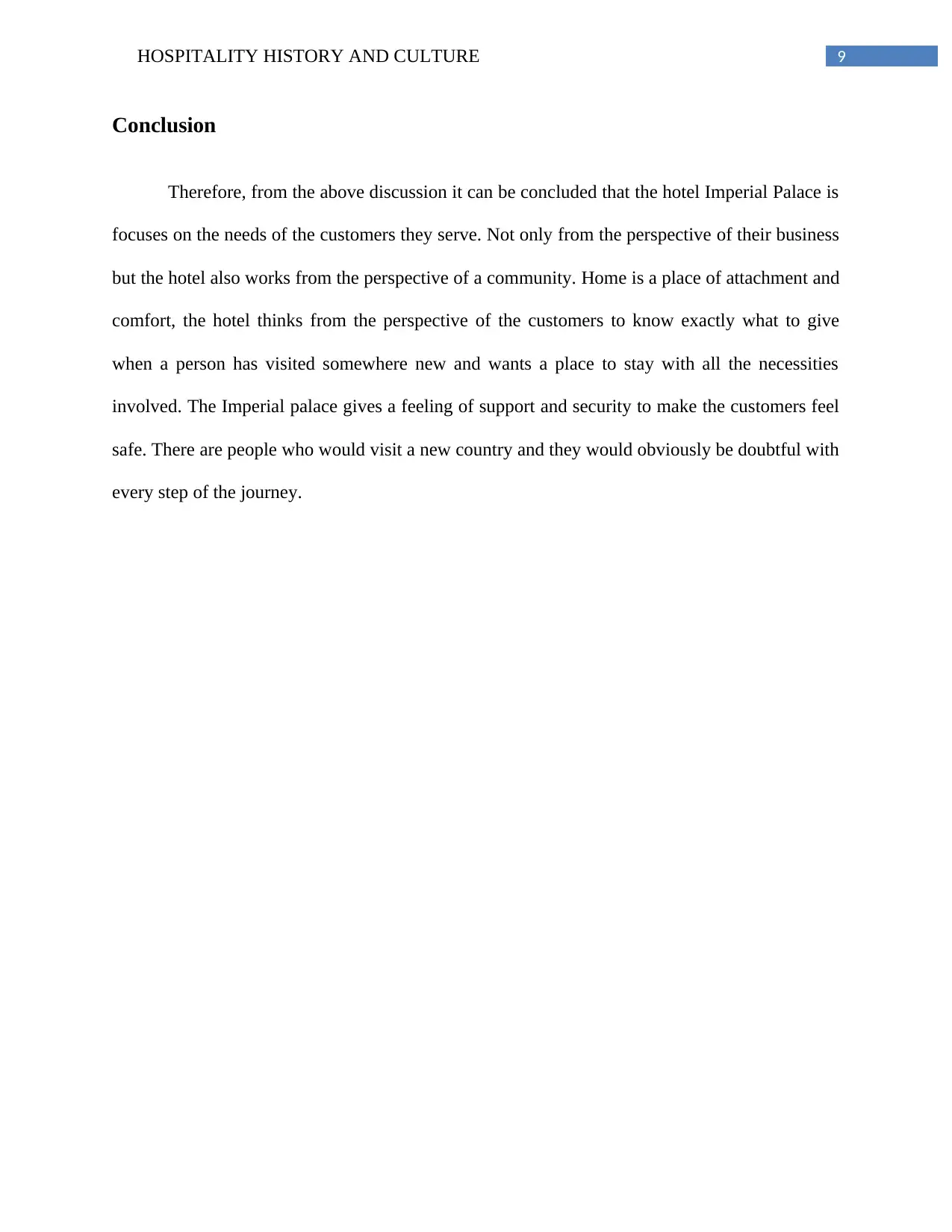
9HOSPITALITY HISTORY AND CULTURE
Conclusion
Therefore, from the above discussion it can be concluded that the hotel Imperial Palace is
focuses on the needs of the customers they serve. Not only from the perspective of their business
but the hotel also works from the perspective of a community. Home is a place of attachment and
comfort, the hotel thinks from the perspective of the customers to know exactly what to give
when a person has visited somewhere new and wants a place to stay with all the necessities
involved. The Imperial palace gives a feeling of support and security to make the customers feel
safe. There are people who would visit a new country and they would obviously be doubtful with
every step of the journey.
Conclusion
Therefore, from the above discussion it can be concluded that the hotel Imperial Palace is
focuses on the needs of the customers they serve. Not only from the perspective of their business
but the hotel also works from the perspective of a community. Home is a place of attachment and
comfort, the hotel thinks from the perspective of the customers to know exactly what to give
when a person has visited somewhere new and wants a place to stay with all the necessities
involved. The Imperial palace gives a feeling of support and security to make the customers feel
safe. There are people who would visit a new country and they would obviously be doubtful with
every step of the journey.
Paraphrase This Document
Need a fresh take? Get an instant paraphrase of this document with our AI Paraphraser
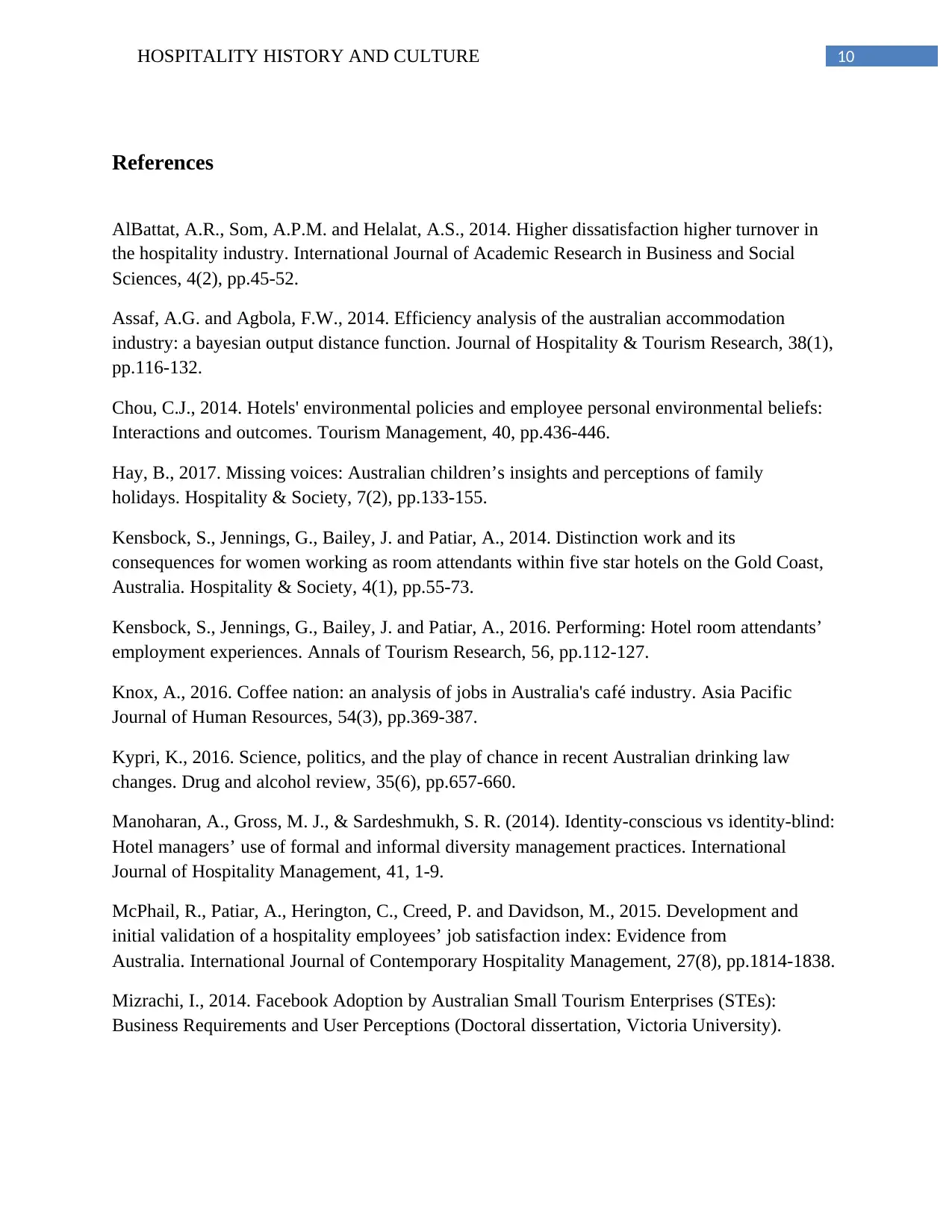
10HOSPITALITY HISTORY AND CULTURE
References
AlBattat, A.R., Som, A.P.M. and Helalat, A.S., 2014. Higher dissatisfaction higher turnover in
the hospitality industry. International Journal of Academic Research in Business and Social
Sciences, 4(2), pp.45-52.
Assaf, A.G. and Agbola, F.W., 2014. Efficiency analysis of the australian accommodation
industry: a bayesian output distance function. Journal of Hospitality & Tourism Research, 38(1),
pp.116-132.
Chou, C.J., 2014. Hotels' environmental policies and employee personal environmental beliefs:
Interactions and outcomes. Tourism Management, 40, pp.436-446.
Hay, B., 2017. Missing voices: Australian children’s insights and perceptions of family
holidays. Hospitality & Society, 7(2), pp.133-155.
Kensbock, S., Jennings, G., Bailey, J. and Patiar, A., 2014. Distinction work and its
consequences for women working as room attendants within five star hotels on the Gold Coast,
Australia. Hospitality & Society, 4(1), pp.55-73.
Kensbock, S., Jennings, G., Bailey, J. and Patiar, A., 2016. Performing: Hotel room attendants’
employment experiences. Annals of Tourism Research, 56, pp.112-127.
Knox, A., 2016. Coffee nation: an analysis of jobs in Australia's café industry. Asia Pacific
Journal of Human Resources, 54(3), pp.369-387.
Kypri, K., 2016. Science, politics, and the play of chance in recent Australian drinking law
changes. Drug and alcohol review, 35(6), pp.657-660.
Manoharan, A., Gross, M. J., & Sardeshmukh, S. R. (2014). Identity-conscious vs identity-blind:
Hotel managers’ use of formal and informal diversity management practices. International
Journal of Hospitality Management, 41, 1-9.
McPhail, R., Patiar, A., Herington, C., Creed, P. and Davidson, M., 2015. Development and
initial validation of a hospitality employees’ job satisfaction index: Evidence from
Australia. International Journal of Contemporary Hospitality Management, 27(8), pp.1814-1838.
Mizrachi, I., 2014. Facebook Adoption by Australian Small Tourism Enterprises (STEs):
Business Requirements and User Perceptions (Doctoral dissertation, Victoria University).
References
AlBattat, A.R., Som, A.P.M. and Helalat, A.S., 2014. Higher dissatisfaction higher turnover in
the hospitality industry. International Journal of Academic Research in Business and Social
Sciences, 4(2), pp.45-52.
Assaf, A.G. and Agbola, F.W., 2014. Efficiency analysis of the australian accommodation
industry: a bayesian output distance function. Journal of Hospitality & Tourism Research, 38(1),
pp.116-132.
Chou, C.J., 2014. Hotels' environmental policies and employee personal environmental beliefs:
Interactions and outcomes. Tourism Management, 40, pp.436-446.
Hay, B., 2017. Missing voices: Australian children’s insights and perceptions of family
holidays. Hospitality & Society, 7(2), pp.133-155.
Kensbock, S., Jennings, G., Bailey, J. and Patiar, A., 2014. Distinction work and its
consequences for women working as room attendants within five star hotels on the Gold Coast,
Australia. Hospitality & Society, 4(1), pp.55-73.
Kensbock, S., Jennings, G., Bailey, J. and Patiar, A., 2016. Performing: Hotel room attendants’
employment experiences. Annals of Tourism Research, 56, pp.112-127.
Knox, A., 2016. Coffee nation: an analysis of jobs in Australia's café industry. Asia Pacific
Journal of Human Resources, 54(3), pp.369-387.
Kypri, K., 2016. Science, politics, and the play of chance in recent Australian drinking law
changes. Drug and alcohol review, 35(6), pp.657-660.
Manoharan, A., Gross, M. J., & Sardeshmukh, S. R. (2014). Identity-conscious vs identity-blind:
Hotel managers’ use of formal and informal diversity management practices. International
Journal of Hospitality Management, 41, 1-9.
McPhail, R., Patiar, A., Herington, C., Creed, P. and Davidson, M., 2015. Development and
initial validation of a hospitality employees’ job satisfaction index: Evidence from
Australia. International Journal of Contemporary Hospitality Management, 27(8), pp.1814-1838.
Mizrachi, I., 2014. Facebook Adoption by Australian Small Tourism Enterprises (STEs):
Business Requirements and User Perceptions (Doctoral dissertation, Victoria University).
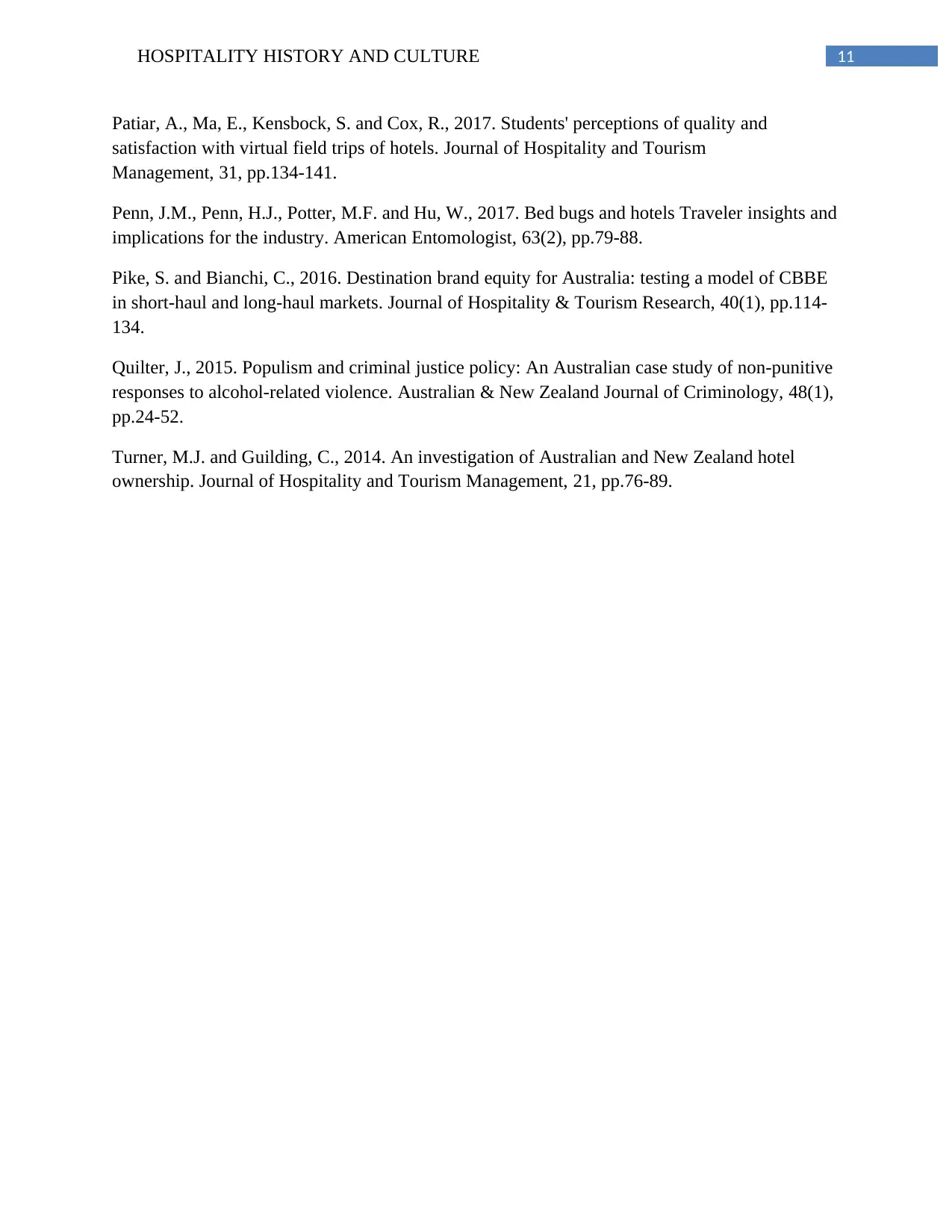
11HOSPITALITY HISTORY AND CULTURE
Patiar, A., Ma, E., Kensbock, S. and Cox, R., 2017. Students' perceptions of quality and
satisfaction with virtual field trips of hotels. Journal of Hospitality and Tourism
Management, 31, pp.134-141.
Penn, J.M., Penn, H.J., Potter, M.F. and Hu, W., 2017. Bed bugs and hotels Traveler insights and
implications for the industry. American Entomologist, 63(2), pp.79-88.
Pike, S. and Bianchi, C., 2016. Destination brand equity for Australia: testing a model of CBBE
in short-haul and long-haul markets. Journal of Hospitality & Tourism Research, 40(1), pp.114-
134.
Quilter, J., 2015. Populism and criminal justice policy: An Australian case study of non-punitive
responses to alcohol-related violence. Australian & New Zealand Journal of Criminology, 48(1),
pp.24-52.
Turner, M.J. and Guilding, C., 2014. An investigation of Australian and New Zealand hotel
ownership. Journal of Hospitality and Tourism Management, 21, pp.76-89.
Patiar, A., Ma, E., Kensbock, S. and Cox, R., 2017. Students' perceptions of quality and
satisfaction with virtual field trips of hotels. Journal of Hospitality and Tourism
Management, 31, pp.134-141.
Penn, J.M., Penn, H.J., Potter, M.F. and Hu, W., 2017. Bed bugs and hotels Traveler insights and
implications for the industry. American Entomologist, 63(2), pp.79-88.
Pike, S. and Bianchi, C., 2016. Destination brand equity for Australia: testing a model of CBBE
in short-haul and long-haul markets. Journal of Hospitality & Tourism Research, 40(1), pp.114-
134.
Quilter, J., 2015. Populism and criminal justice policy: An Australian case study of non-punitive
responses to alcohol-related violence. Australian & New Zealand Journal of Criminology, 48(1),
pp.24-52.
Turner, M.J. and Guilding, C., 2014. An investigation of Australian and New Zealand hotel
ownership. Journal of Hospitality and Tourism Management, 21, pp.76-89.
⊘ This is a preview!⊘
Do you want full access?
Subscribe today to unlock all pages.

Trusted by 1+ million students worldwide
1 out of 12
Related Documents
Your All-in-One AI-Powered Toolkit for Academic Success.
+13062052269
info@desklib.com
Available 24*7 on WhatsApp / Email
![[object Object]](/_next/static/media/star-bottom.7253800d.svg)
Unlock your academic potential
Copyright © 2020–2025 A2Z Services. All Rights Reserved. Developed and managed by ZUCOL.





